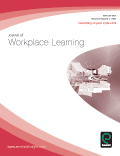
Journal of Workplace Learning
Scope & Guideline
Empowering Organizations through Knowledge
Introduction
Aims and Scopes
- Workplace Learning Dynamics:
The journal focuses on various aspects of workplace learning, including formal and informal learning processes, learning cultures, and the role of social dynamics in enhancing learning experiences. - Impact of Technology on Learning:
It explores the integration of technology in workplace learning, such as virtual reality, e-learning, and digital collaboration tools, examining their effects on engagement, training effectiveness, and knowledge transfer. - Employee Well-being and Resilience:
The journal emphasizes the importance of employee well-being, resilience, and psychological empowerment as factors that influence learning and performance in the workplace. - Organizational Learning and Development:
It investigates organizational learning capabilities, knowledge sharing, and the development of learning organizations, highlighting strategies that promote continuous learning and innovation. - Diversity, Equity, and Inclusion in Learning:
The journal addresses the significance of diversity, equity, and inclusion in workplace learning, focusing on how these aspects influence employee engagement and learning outcomes.
Trending and Emerging
- Integration of Virtual and Augmented Reality:
A growing focus on utilizing virtual and augmented reality technologies in workplace training and learning experiences, aimed at enhancing engagement and practical skill development. - Resilience and Mental Well-being:
Increased attention to employee resilience and mental well-being, exploring how these factors impact learning, performance, and overall organizational health. - Agile and Adaptive Learning Strategies:
Emerging research emphasizes agile learning approaches that can quickly adapt to changing workplace demands and environments, reflecting the need for flexibility in learning solutions. - Collaborative and Social Learning:
A trend towards understanding the role of social and collaborative learning in enhancing workplace outcomes, recognizing the importance of peer interactions and knowledge sharing. - Focus on Diversity and Inclusion:
A notable increase in research addressing the role of diversity and inclusion in workplace learning, examining how these factors contribute to enriching learning environments and outcomes.
Declining or Waning
- Traditional Training Methods:
There appears to be a decline in research focused on traditional training methods, such as classroom-based learning, as newer, more innovative approaches gain traction in the workplace. - One-size-fits-all Learning Strategies:
The journal has moved away from generalized learning strategies that do not consider individual differences and contextual factors, reflecting a shift towards more tailored and adaptive learning solutions. - Static Models of Learning:
Research utilizing static models of learning that do not account for the dynamic and evolving nature of workplace environments and practices has become less prevalent, indicating a preference for more flexible and responsive frameworks. - Focus on Post-Training Evaluation:
Previous emphasis on post-training evaluation metrics has waned, as the focus shifts towards understanding the ongoing learning processes and their integration into daily work practices. - Limited Perspectives on Informal Learning:
There is a noticeable decrease in studies solely addressing informal learning without considering its relationship with formal learning structures, suggesting a more integrated approach is now favored.
Similar Journals

INDUSTRIAL AND COMMERCIAL TRAINING
Pioneering Research at the Crossroads of Business and EducationINDUSTRIAL AND COMMERCIAL TRAINING is a prestigious academic journal published by Emerald Group Publishing Ltd, focusing on the intersection of business, education, and human resource management. Established in 1969 and continuing through to 2024, the journal provides a vital platform for researchers and practitioners to disseminate innovative ideas and practices in training within the industrial and commercial sectors. With a strong commitment to advancing knowledge in the field, it holds noteworthy Q2 rankings in Business, Management and Accounting and Education, as well as a solid standing in the Organizational Behavior and Human Resource Management category. Although it does not offer open access, the journal's rigorous peer-review process ensures high-quality contributions that are invaluable for those aiming to enhance their expertise in professional training modalities. Leveraging its significant impact factor and Scopus rankings, INDUSTRIAL AND COMMERCIAL TRAINING serves as an essential resource for academics, industry leaders, and students alike, fostering a deeper understanding of effective training strategies in today’s dynamic business environment.
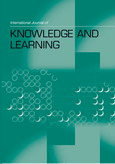
International Journal of Knowledge and Learning
Empowering educators with cutting-edge insights.International Journal of Knowledge and Learning, published by INDERSCIENCE ENTERPRISES LTD, is a pivotal platform in the field of education, positioned within the Q3 category according to the 2023 quartiles. With an ISSN of 1741-1009 and E-ISSN of 1741-1017, this journal serves as a crucial resource for researchers, educators, and policy makers who are keen on advancing the dialogue surrounding knowledge dissemination and learning processes. Covering a wide array of topics within the educational sector, the journal has remained a respected outlet for scholarly work since its inception in 2005, with recent converged years extending through 2024. The journal's Scopus ranking places it securely in the 44th percentile among over 1,500 educational journals, emphasizing its significance in disseminating quality research. While it does not currently offer open access, its contribution to the academic community remains substantial, attracting submissions that foster innovative thought and empirical study in educational practices worldwide.

JOURNAL OF APPLIED PSYCHOLOGY
Connecting academic rigor with practical relevance.JOURNAL OF APPLIED PSYCHOLOGY, published by the American Psychological Association, is a leading peer-reviewed journal in the field of applied psychology, with a distinguished legacy dating back to 1917. Renowned for its commitment to advancing the understanding of psychological principles in real-world contexts, this journal occupies a prestigious position as evidenced by its Q1 ranking in applied psychology and a remarkable 97th percentile in Scopus rankings, standing at 6th among 249 journals in its category. The journal publishes high-quality research that addresses critical issues faced by individuals, organizations, and communities, thereby contributing valuable insights to both academic and practitioner audiences. With no open access options available, it remains exclusive to subscribed institutions, ensuring rigorous peer review and high standards of publication. Researchers, professionals, and students will find a wealth of knowledge and innovative ideas in each issue, making it an essential resource for those seeking to enrich their understanding of applied psychological practices.

European Journal of Innovation Management
Advancing the frontiers of innovation management.Welcome to the European Journal of Innovation Management, a premier scholarly publication committed to advancing the field of innovation management. Published by Emerald Group Publishing Ltd, this journal boasts an impressive impact factor and proudly stands within the Q1 category for Management of Technology and Innovation, ranking #40 out of 289 in the Scopus database, placing it in the top 86th percentile of its category. Since its inception in 1998, the journal has become a critical platform for researchers, professionals, and students eager to explore the dynamic interplay between innovation strategies, technological advances, and organizational effectiveness. Although it is not an open-access journal, its wide-ranging scope encourages submissions that encompass theoretical insights, empirical research, and case studies, thereby fostering a deeper understanding of effective innovation practices across diverse sectors. Join the community of thought leaders and be at the forefront of innovation research through this esteemed publication.
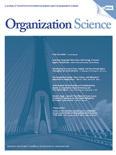
ORGANIZATION SCIENCE
Pioneering Research in the Heart of Organizational StudiesORGANIZATION SCIENCE is a premier academic journal published by INFORMS, focusing on the interdisciplinary field of organizational studies. With an impressive ranking in the top quartile (Q1) across various categories—including Management of Technology and Innovation, Organizational Behavior and Human Resource Management, and Strategy and Management—this journal has established itself as a critical platform for disseminating pioneering research. The journal's commitment to advancing understanding of organizational processes and structures since its inception in 1996 is reflected in its rigorous selection criteria and high-impact contributions to the field. Researchers, professionals, and students engaged in exploring the dynamics of organizations will find valuable insights within its pages, empowered by critical reviews, empirical studies, and theoretical advancements. Although ORGANIZATION SCIENCE is not open access, it provides a vital resource for those seeking to enhance their knowledge and apply innovative strategies to real-world organizational challenges. With its ongoing convergence into the latest trends through 2024, this journal remains a cornerstone of scholarly communication and a must-read for those committed to the study of organizational phenomena.
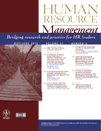
HUMAN RESOURCE MANAGEMENT
Shaping the Future of HR with Cutting-Edge ResearchHUMAN RESOURCE MANAGEMENT, published by Wiley Periodicals, Inc, is a leading academic journal that has been at the forefront of research in the fields of Applied Psychology, Organizational Behavior, and Human Resource Management since its inception in 1961. With a remarkable impact factor and consistently rated in the Q1 quartile across multiple categories, it is recognized for its rigorous peer-reviewed articles that provide significant insights into the management of human resources and organizational effectiveness. This journal has earned a prestigious standing, ranking #13 in Organizational Behavior and Human Resource Management, and #20 in Applied Psychology according to Scopus metrics, placing it in the top percentiles of its field. Although it does not currently offer Open Access options, HUMAN RESOURCE MANAGEMENT remains a vital resource for researchers, professionals, and students eager to explore innovative strategies and practices within the ever-evolving landscape of human resource management. Its commitment to advancing scholarly dialogue and practical applications makes it an essential tool for those looking to stay at the cutting edge of this dynamic discipline.
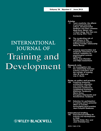
International Journal of Training and Development
Shaping the Future of Training Through ResearchThe International Journal of Training and Development, published by WILEY, is a premier academic journal dedicated to the dynamic fields of education and human resource development. With an ISSN of 1360-3736 and an E-ISSN of 1468-2419, this journal has established itself as a critical resource for researchers and practitioners alike, boasting a Q2 ranking in both Education and Organizational Behavior and Human Resource Management categories as of 2023. The journal, with a significant impact factor, is committed to advancing knowledge through empirical research, theoretical analysis, and integrative reviews that explore the latest trends, practices, and theories in training and development. Since its inception in 1997, it has served as a vital platform for scholarly discourse and innovation. Moreover, drawing on its recognized standing within Scopus, where it ranks in the 69th percentile for Education and the 51st percentile for Organizational Behavior, the International Journal of Training and Development fosters an interdisciplinary dialogue aimed at enhancing workforce development and organizational effectiveness. Researchers, educators, and professionals seeking to impact the field will find valuable insights and transformative ideas within its pages.
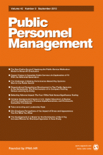
PUBLIC PERSONNEL MANAGEMENT
Innovating Human Resource Management in the Public SectorPUBLIC PERSONNEL MANAGEMENT, published by SAGE Publications Inc., is a renowned scholarly journal dedicated to the advancement of research in the fields of public administration, human resource management, and organizational behavior. With an impressive impact factor that places it in the Q1 category across various relevant disciplines—including Management of Technology and Innovation, Organizational Behavior, and Public Administration—this journal serves as a pivotal resource for academics, practitioners, and policy-makers alike. The journal’s scopus ranking reflects its significant contribution to the social sciences, particularly in public administration, where it ranks #39 of 232 within its category, accommodating the highest percentile benchmarks. Established in 1973, it has continuously provided critical insights, empirical research, and theoretical discussions aimed at enhancing public personnel management practices. Though not currently an open-access journal, its comprehensive coverage makes it indispensable for those seeking to explore innovative approaches and best practices in public sector personnel management. With SAGE's commitment to high-quality publishing, PUBLIC PERSONNEL MANAGEMENT exemplifies excellence and relevance within social science research and its application.

JOURNAL OF BUSINESS AND PSYCHOLOGY
Bridging the gap between psychological theory and business practice.JOURNAL OF BUSINESS AND PSYCHOLOGY is a premier academic journal published by Springer, dedicated to advancing the fields of applied psychology and business management. With an ISSN of 0889-3268 and an E-ISSN of 1573-353X, this journal has been at the forefront of interdisciplinary research since its inception in 1986 and continues to serve as a vital resource for researchers, professionals, and students alike. The journal is currently recognized as a Q1 journal in several categories, including Applied Psychology, Business and International Management, and general categories within Psychology and Business, Management and Accounting, further asserting its significant impact and relevance in the academic community. It boasts top rankings in Scopus, maintaining prestigious positions that reflect its commitment to quality and innovation in research, including an impressive percentile rank of 91st in General Psychology. Despite not being an open access journal, JOURNAL OF BUSINESS AND PSYCHOLOGY provides invaluable insights that shape contemporary understandings of psychological principles in business contexts, making it essential reading for those interested in the convergence of insights in both fields.
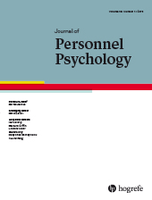
Journal of Personnel Psychology
Transforming Organizational Dynamics Through ResearchThe Journal of Personnel Psychology, published by HOGREFE PUBLISHING CORP, is an esteemed academic journal dedicated to disseminating high-quality research and insights in the fields of applied psychology, organizational behavior, and human resource management. With an ISSN of 1866-5888 and an E-ISSN of 2190-5150, this journal aims to foster a deeper understanding of psychological principles applied within workplace settings. Boasting a 2023 category rank of Q2 in both Applied Psychology and Organizational Behavior, the journal reflects its pivotal role in advancing scholarly discourse. Open access options allow for broader engagement with its content, making research findings accessible to a global audience. As researchers, professionals, and students navigate the complexities of human behavior in organizational contexts, the Journal of Personnel Psychology remains an invaluable resource for theoretical exploration and practical application, covering innovative topics and methodologies from 2010 to 2024.